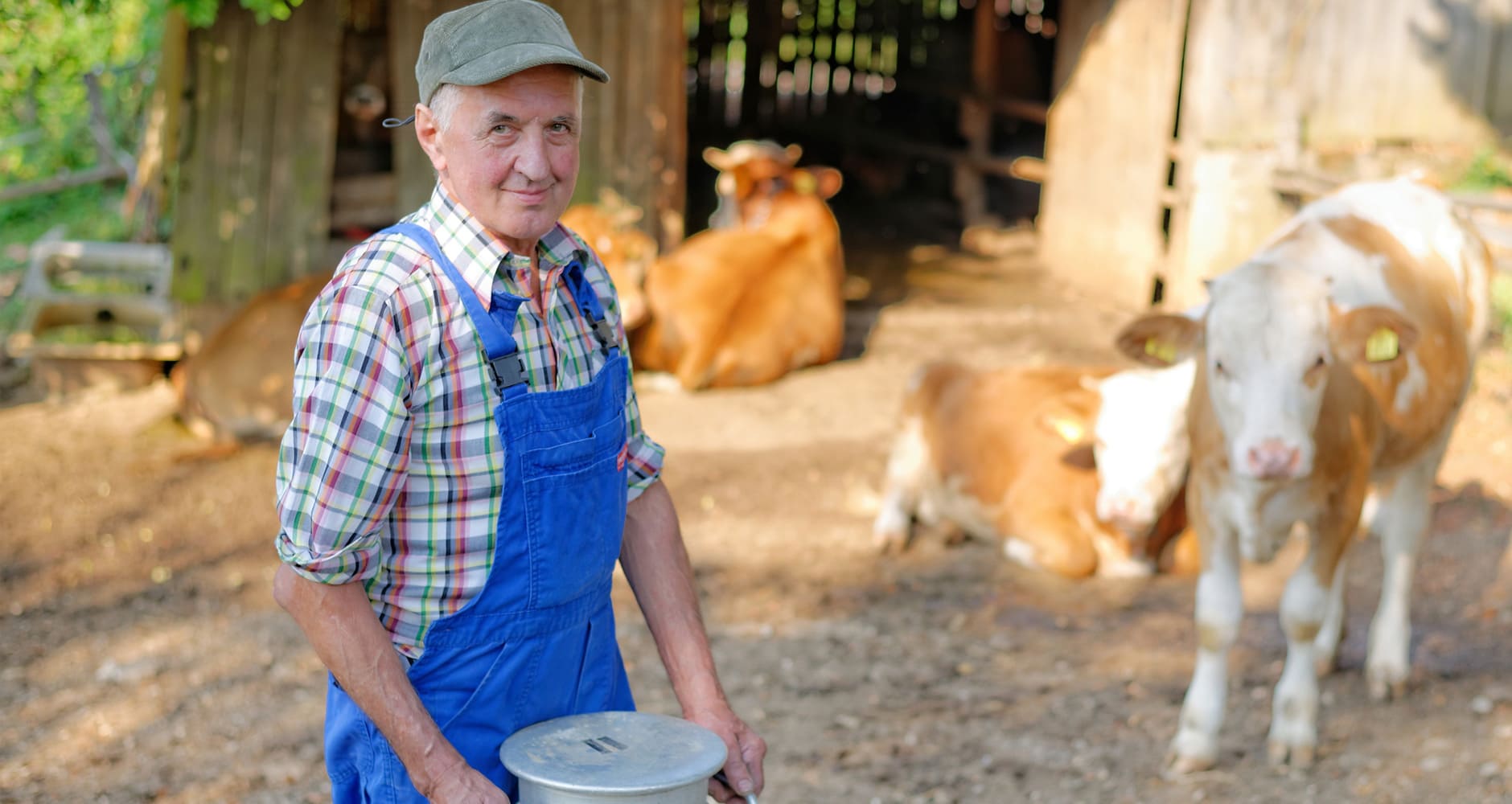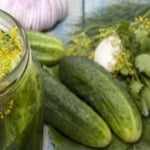Is Raw Milk Safe to Drink?
Raw milk comes straight from the cow without being pasteurized. But how could drinking unpasteurized milk be safe? We explain.

Raw milk is, quite simply, milk that comes straight from the cow without being pasteurized. But, they pasteurize milk for a reason, right? So, how could drinking unpasteurized milk be safe?
Pasteurization involves heating foods, then rapidly cooling them again to kill off any microorganisms living in the food. The process, invented by biologist Louis Pasteur in 1864, can prevent people from contracting many kinds of food-borne illnesses like salmonella or E. coli. But what did people do before pasteurization? Did they just get sick? In many cases, yes, they did. That’s why pasteurization was invented in the first place. Necessity is the mother of invention, after all. But that’s not quite the whole story.
Haven’t People Been Drinking Raw Milk Forever?
Actually, people had been drinking raw milk, straight from their own cows, sheep, and goats, for millennia without getting sick. Milk has long been one of the most nutritionally complete foods in the human diet and has been an important part of nearly every culture’s cuisine. If it had always made people sick, we would have stopped drinking it long ago. So, what happened? Why did raw milk, something we’d been drinking for thousands of years, suddenly start making people sick?
The Industrial Revolution is what happened. People began moving from the country to large cities, and the world’s population began to explode. People were no longer getting milk from the cow in their own, or their neighbors’, backyards. They were buying it from stores or having it delivered by dairies. Farms, once the center of a community’s food supply, became businesses. And, like most businesses, they grew larger and larger, and more and more interested in making a profit, even, at times, to the detriment of the quality of their product.
Soon, dairy cows, which had always lived in open fields and grazed on fresh grass, were herded into cramped, unsanitary pens and fed grains — sometimes even waste grains from alcohol distilleries — that weren’t a part of their natural diet. The result was increasingly unhealthy cows that produced sometimes infected milk. To make this milk safe for human consumption, it had to be pasteurized.
Can Milk Go Back To Being Safe?
In recent years, though, there has been a growing number of people who believe that, by returning cows to open fields, feeding them grass, and milking them under sanitary conditions, you can get milk that is safe enough to be consumed without being pasteurized. But why bother? If pasteurization kills off bacteria, why not just treat all milk to be on the safe side?
Pasteurization Problems
Proponents of raw milk say the fact that pasteurization kills off bacteria is actually a problem. In addition to killing potentially harmful bacteria, pasteurization also kills the many beneficial microorganisms, including probiotics, naturally found in milk. Raw milk drinkers say these “good bacteria” can aid in digestion and overall health. These bacteria can help our bodies to more efficiently break down the foods we eat, and get the most nutrients from them. Plus, milk is high in lactic acid, a natural acid that is able to keep “bad bacteria” in check, as long as the milk comes from a healthy cow.
Because its beneficial bacteria are intact, raw milk is often touted as a potential alternative for people who are lactose-intolerant. The bodies of lactose-intolerant people don’t produce enough of the enzyme lactase to digest lactose, a sugar found in milk. But raw milk includes a helpful bacteria called Lactobacilli that breaks down the lactose for you.
In addition to killing off bacteria, pasteurization also changes the structure of the milk, breaking down the proteins that can be used by our bodies as antibodies to fight off illness and infection. Raw milk fans say these antibodies fight off viruses, increase our resistance to environmental toxins, and may even help to reduce the severity of some chronic conditions, like asthma.
Like any other food sold commercially, raw milk is periodically tested for harmful bacteria and other impurities and must be certified safe. Not just any dairy can sell its milk raw. The production must meet certain conditions and follow a strict set of safety standards.
If you’re interested in trying raw milk, you may be able to find it your local a natural foods store. Or check out this link to find out if there is a certified raw dairy near you.

Jaime McLeod
Jaime McLeod is a longtime journalist who has written for a wide variety of newspapers, magazines, and websites, including MTV.com. She enjoys the outdoors, growing and eating organic food, and is interested in all aspects of natural wellness.







BTW, Jaime great article! Great articles generate great comments that make you want to read them all! lol
Thank you so much for this ❤ ? ???????????????
Very balanced article. After the read, I did not know if the question was answered, or if the author had a preference. Sounds like he suggests we be careful and know the farmer. Something I agree on completely. It is legal in IL for sales on the farm. I have cattle for meat sales that are 100% grass fed. I would have to do a lot of work to milk.. Might just for our personal consumption.
Glad you found it helpful, Jon. Thanks for taking the time to comment!
I never use straws. It’s just unnecessary and not good for the environment.
This guy is a moron. Pushing the grass fed narrative. Never milked a cow in his life. The natural parasites cows get are in the grass. A properly fed cow in a clean environment is a good start to good milk. I grew up on fresh milk as did my as did my wife and our parents. Granny is currently 89, the youngest at death was 75. So I’d say as long as the milk is kept clean and handled correctly I see no reason to be afraid to use it. Seems damn funny to me that all these earth muffins growing veggies and selling them all over the place don’t have the guidelines and inspections at their farms the dairy industry has, Why?? Who knows what they are using for fertilizer and mulch.
milk straight from cow is one of the healthiest food on the planet. all other milk/milkthings from shops are rubbish.
We just got fresh milk from a cow,do we have to boil it or can we just drink it. We want to be safe cause we have kids…is it necessary to boil it
Thank you.
No, it is not necessary to boil it take the fresh milk after milking it straight from the cow and get you a white cloth a white pillow slip washed in water and bleach with no softener is best my family has used a pillow case for generations,just split it open and put it over a clean glass container and strain it thru the cloth into the container and place into the fridge. After it sets overnight it will form a thick layer of cream on top just skim it off top and drink the fresh milk and if you’d like fresh unsalted butter skim the cream from the top of several milkings and put it into a container and when you get enough like a 1/2 a gallon or so put it into a gallon glass jar and put the top on it and shake it while watching TV for about an hour and watch the butter appear it will be in clots in the jar but you gather it and pat it into a container and chill and enjoy you can add salt to taste if you’d like when patting the butter and the milk off of the butter will be. You guessed it butter milk.
The most important thing when consuming raw milk is to keep it very cold to prevent further bacterial growth and souring of the milk. That said, raw milk is better tasting than any milk you will ever get from the grocery store that has been pasteurized. The raw milk dairy where we get our milk cools it right away and when we get it, it is only 2-3 hours from when the cow was milked. I have bad allergies to store bought milk, but no problems with raw milk. Pasteurized milk still has all the same bacteria, and being that they are dead, they release their toxins which many scientists believe are responsible for the allergies cause by the pasteurization. Yeah for raw milk!
How did farmers keep their milk cold before Refrigeration was invented? Did you know the US is the only country that washes and ships and sells eggs refrigerated? We don’t wash our chickens eggs and just leave them in a basket in the pantry until needed (for up to 2 months sometimes). They stay fresher longer than refrigerated eggs.
I was just looking into buying a jersey. I need to read up on it a lot more bc I have no idea on what I’m doing. I would love to make my own butter and cheese. And have never tasted “REAL MILK” the cow is 2000.00 so before I make an investment like that I would love to know more about it and from what I have read on this page everyone seems to love be the fresh stuff better. By husband goes out every year and shoots a deer and an elk so our freezer stays full of “fresh”meat. But I buy a 1/4 of a cow bc I’m don’t like the taste of elk or deer. But I can honestly say that the fresh butchered cow tastes so much better than store bought crap.
2,000! That’s quite a bit of money for a cow. If I were you I would find a different farmer, they’re 1,200 for a mature cow but if you raise them young you can get it for 500. Maybe it’s the different locations.
Do more homework on buying a jersey cow. $2000 is way too much!! $800-$1200 is even high in some places. Even traveling a few miles to get it might save you tons
When I was a little girl I used to drink “raw” caw milk we boiled it before drinking it. And now whenever I go back to South America I still do I miss it here in the U.S. I wish it was easier to get.
boiling the milk destroys the nutrients, proteins and vitamins and defeats the purpose of buying raw milk